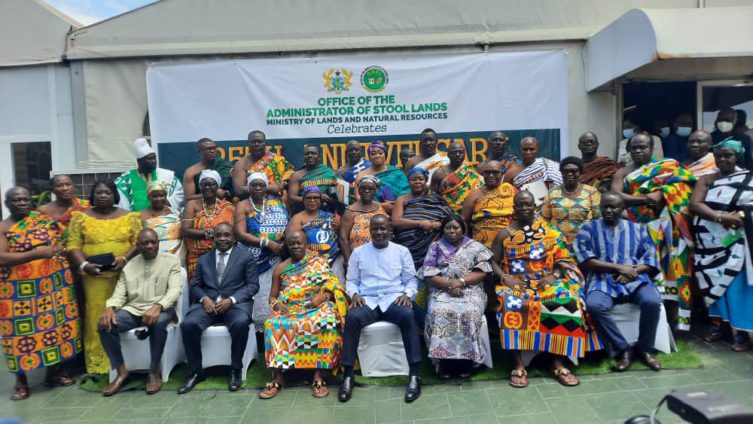The Asantehene, Otumfuo Osei Tutu II, is requesting the establishment of a monitoring team to ensure judicious use of stool lands revenue.
Fifty-five per cent of the amounts accrued to stool lands are allocated to the District Assemblies for development.
The Asantehene believes there is a need for the public to access information on the use of the revenue to ensure development.
“The assemblies owe us a duty to account to Nananom and our subjects the judicious utilization of our revenues. But, unfortunately, our people mistakenly demand when indeed Clause 6 of Article 267 of the 1992 Constitution enjoins Nananom to use their stool shares of the revenue for the maintenance of the stool in keeping with the status”, Chief of Domeabra Asante Akyem, Baffour Owusu Bediako represented the Asantehene at the 25th Anniversary Celebration of the Office of Administration for Stool Lands.
He added, “there is the need to faction out monitoring and evaluation team comprising the OASL, the Ministry of Lands and Natural Resources, and Ministry of Local and Rural Development concerning the use of these revenues by the MMDAs”.
By law, 55% of revenue collected in stool lands is allocated to Metropolitan, Municipal and District Assemblies for development.
Twenty-five per cent of the allocation is given to the stools while the traditional authority gets twenty per cent and the Office of the Administrator of Stool Lands maintains ten per cent as administrative charge.
Though the law requires the assemblies to put inscriptions of the funding source on all projects from the fund, traditional authority believes more should be done.
President of the National House of Chiefs says some MMDAs have failed to utilize their fund share to benefit their areas.
Ogyeahohuo Yaw Gyebi explains, “My observation is the completion of developmental projects by MMDAs, we congratulate them but let me take this opportunity to warn those who use the money to collect garbage, they should cease from that because garbage when it is taken it is difficult to go back to account for the quantity taken and that, is where the leakage is”.
Meanwhile, illegal mining in parts of the country is negatively impacting stool land revenue.
The destruction of lands in the quest to mine for gold has rendered them useless. There are, therefore, no occupants to fulfil financial obligations in ground rent.
Lands Minister, Samuel Abu Jinapor, explains that the war against illegal mining will increase revenue accrued through stool lands.
“I will crave the indulgence of Nananom to continue to work with us in the fighting against this canker. We are also pursuing an aggressive afforestation scheme which will see to the reclamation of some degraded stool lands to make them economically viable.
The Office for Stool Lands has reiterated its preparedness to work with stakeholders to improve collection and use of stool land revenue.
Administrator, Ama Edumadze Acquah explains the office, through intensive collection efforts increased collection to almost ¢100 million in 2020.
She explains the digitalization of the service provided will help increase revenue mobilisation.
Latest Stories
-
One person arrested for allegedly killing queen mother at Nungua
28 minutes -
Pusiga hosts Tomorrow’s Icons Awards to showcase young talent
52 minutes -
Empowering Girl Child: My Beautiful Teenage Life initiative takes off in Ablekuma North
1 hour -
Onana v De Gea verdict after Man Utd keeper’s latest error
1 hour -
Mourinho given four-match ban for comments after Istanbul derby
1 hour -
Starmer charms Trump, but any deals will have to wait
2 hours -
King Charles invites Trump for ‘unprecedented’ second state visit
2 hours -
Katy Perry to head to space on Blue Origin all-women flight
2 hours -
Trump commends Zelensky ahead of White House talks
2 hours -
Trump says US will impose additional 10% tariff on China
3 hours -
UK-US trade deal could mean tariffs ‘not necessary’, says Trump
3 hours -
South African leader wants to do a deal with Trump to resolve dispute
3 hours -
Gene Hackman’s daughters and Clint Eastwood lead tributes to star
3 hours -
Trump administration unveils bird flu plan as egg prices soar
3 hours -
Trump could meet King Charles in Scotland to plan state visit
4 hours

